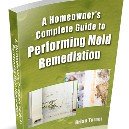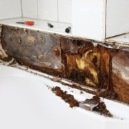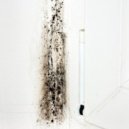Find a pre-screened local mold removal specialist Free Estimate
Find a Mold Specialist Now
Click or Call, Toll-Free 24/7
Fatigue Due to Mold Exposure
Low energy and fatigue are fairly common mold exposure symptoms. You may already be aware of other, even more common symptoms of exposure to mold, like respiratory problems, sinus infections, coughing, sneezing, wheezing, shortness of breath, headaches or migraines, rashes or hives, allergy symptoms and asthma attacks. You should know that mold exposure can make you tired, as well.
In some instances, the lack of energy caused by mold exposure can be fairly debilitating. It’s one thing to feel a bit tired but quite another to need 14 or 16 hours of sleep every day, to be unable to work due to sheer exhaustion, or to have so little energy you can’t stand up long enough to take a shower.
Why Does Exposure to Mold Cause Fatigue?

Exposure to mold can cause you to feel very tired for many reasons. Respiratory problems like pneumonia can actually limit the amount of oxygen you can take in, which makes you feel tired. Symptoms like coughing and wheezing can keep you awake at night, causing you to feel tired the next day. Low energy is a common symptom of many illnesses and infections, so if you have a sinus infection, bronchitis or pneumonia related to mold exposure, that can make you tired. A couple of studies, including one conducted by researchers at the Brown University School of Medicine and one conducted by researchers at the Hennepin County Medical Center in Minneapolis, found a link between exposure to mold and depression, and lack of energy is a common symptom of depression. Some researchers have linked mold exposure to conditions like chronic fatigue syndrome and fibromyalgia, symptoms of which include exhaustion.
What Should You Do if You Think Mold is Making You Tired?
If you are suffering from unexplained fatigue, see your physician. Numerous conditions can cause exhaustion in addition to mold exposure, including simply not getting enough sleep at night, sleep apnea, nutritional deficiencies like iron deficiency and vitamin B12 deficiency, bacterial or viral infections, thyroid disorders, heart problems, liver or kidney problems, depression, fibromyalgia and more. Your doctor may order tests, including blood tests, to help determine what’s making you so tired.
Let your doctor know about any other symptoms you’re experiencing, including other mold exposure symptoms, and let your doctor know if you’ve been exposed to mold or think mold might be causing your low energy level. It’s possible that several factors are working together to cause your exhaustion and it may take some time for your doctor to sort it out.
In the meantime, if you’ve discovered mold in your home, you need to get it removed as soon as possible. Exposure to mold can lead to all sorts of health problems, some of them quite serious. Even if your doctor isn’t certain the mold is causing your exhaustion, you want to remove it before it leads to additional health problems. It can also cause structural damage to your home if allowed to get bad enough.
Getting Professional Assistance and Advice
We recommend calling in a mold remediation professional for a free home inspection and consultation. He or she will make sure all areas of mold in your home have been located, which is important since mold often grows in hard-to-find places like inside heating, ventilation and air conditioning ducts, inside walls and under flooring. He or she will advise you about the work that needs to be done in order to make your home mold-free and safe again. To locate mold remediation professionals in your area, follow the link.
Since the initial inspection and consultation are free, you can get some helpful professional advice at no cost even if you plan to handle the cleanup job yourself. However, if you’re suffering from exhaustion related to mold exposure, you may not have the energy to do the work yourself since mold remediation is often a complex, involved job. We also suggest checking with your doctor to make sure it’s safe for you to handle mold removal yourself and to make sure it won’t exacerbate your symptoms.
Return From Fatigue from Mold Exposure To Our Main Symptoms Page
Free Home Inspection By A Mold Removal Specialist
Search This Website
Recent Articles
-
See Our 5 Recommended Mold Removal Companies in Aberdeen, SD
Oct 08, 21 04:05 PM
-
Public Housing Tenant Sick from Mold
Apr 24, 20 01:40 PM
-
Mold Types Found In Homes .......Identification, Finding Mold, Testing
Jan 27, 20 02:32 PM




